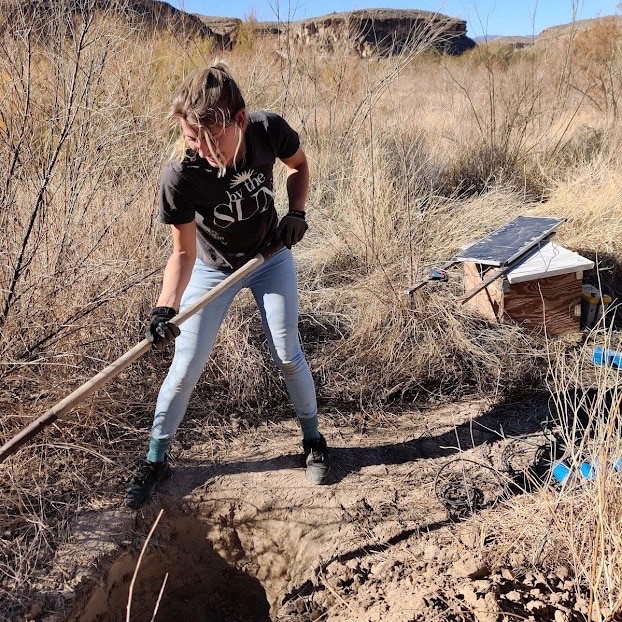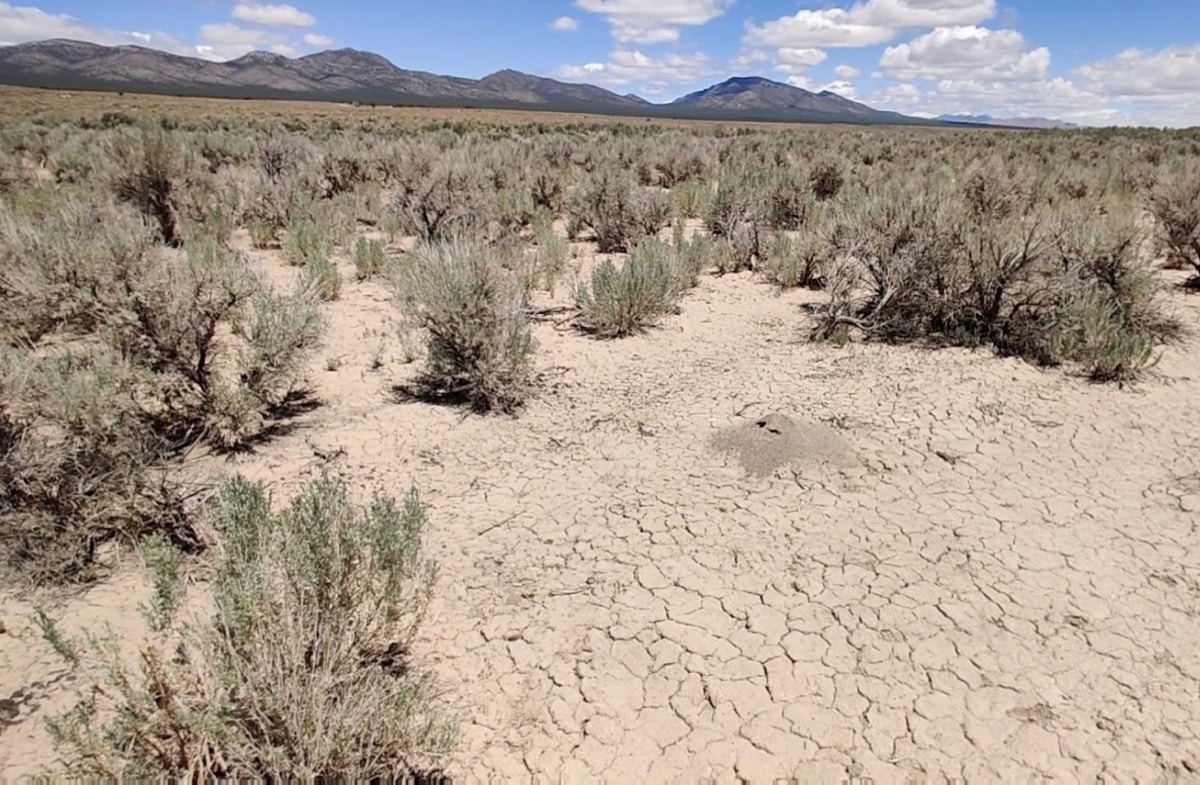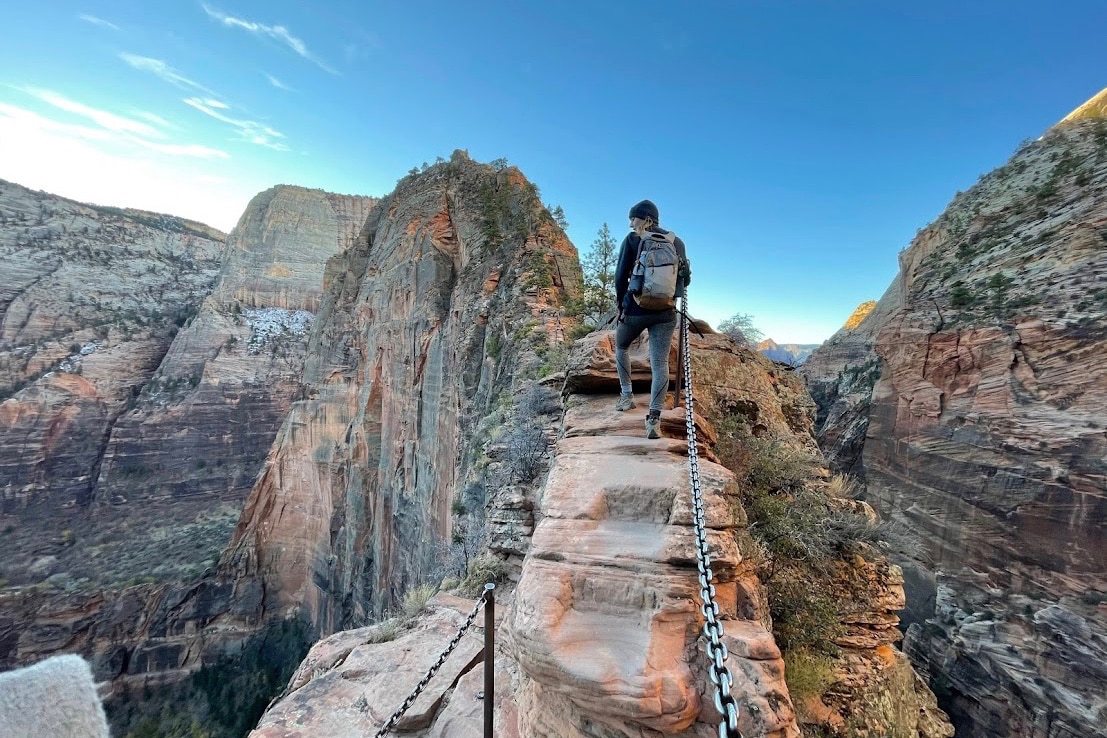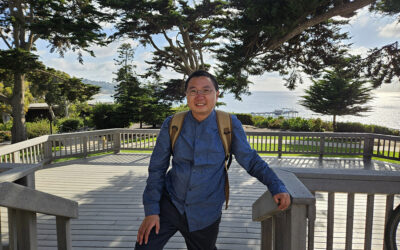Meet Charlotte van der Nagel, Graduate Researcher
DECEMBER 6, 2021
LAS VEGAS, NEV.
Geoscience
Ecohydrology
Ecosystem Sciences
Above: Charlotte van der Nagel during sunrise at Reflection Canyon, Utah.
Credit: Charlotte van der Nagel.
Charlotte van der Nagel is a graduate research assistant with the Division of Earth and Ecosystems Sciences at DRI in Las Vegas and a Ph.D. student in the Geoscience program at University of Nevada, Las Vegas. Learn more about Charlotte and her graduate research in this interview with DRI’s Behind the Science blog!
DRI: What brought you to DRI?
van der Nagel: I am originally from the Netherlands. I worked with Dr. Henry Sun at DRI for half a year in 2020 as part of the research for my master’s thesis. This time allowed me to get to know DRI – and Nevada as a whole – and I sure liked it a lot! So, when a Ph.D. position became available that continued the research I had already started the year before, I didn’t doubt for a single second and applied for it, which brought me back to DRI and Las Vegas in August 2021.
DRI: What are you studying?
van der Nagel: The main focus of my study is ecohydrology. This discipline focuses on the interaction between water and ecology. I am particularly interested in how the desert ecosystem can support life with such limited water availability.

Charlotte van der Nagel in the field digging a hole to bury multiple TDR sensors to monitor soil moisture distribution over depth and time in Arrow Canyon near Moapa, NV.
Credit: Charlotte van der Nagel.
DRI: What research projects are you working on? And who at DRI are you working with?
van der Nagel: I work with my Ph.D. advisor Dr. Henry Sun. My main project is a study that focuses on the occurrence of barren circles of on average 13ft in diameter, surrounding a central ant nest. These circles are found throughout most of the western U.S. and are even visible from satellite images. Ants keep the circles barren by cutting down any seedling that wants to establish inside of the circle, yet ants depend on these plants for their food source. By keeping the circle barren, the ants take away their nearest food source, which does not make sense from a biological viewpoint. In this study, we will try to find the driving force for ants to display this disk clearing behavior.
Another project I recently started working on involves regional die-back of Screwbean Mesquite trees. As these trees are of high ecological significance, there is a lot of interest from different agencies to study the die-back and find possible causes to explain and possibly revert this die-back. For this study, I will be looking at soil moisture conditions, N15 and O18 isotopes of the trees, and sulfide concentrations and redox conditions in the groundwater.

Charlotte van der Nagel is working with her advisor, Dr. Henry Sun, to study ants nests found within barren circles in the Great Basin and other western ecosystems. Ants keep the circle barren by cutting down vegetation that grows inside the circle, but scientists do not yet understand the reason for this behavior.
Credit: Charlotte van der Nagel.
DRI: What are your short-term and long-term goals while at DRI?
van der Nagel: As I just started my Ph.D. program a couple of months ago, my short-term goal would be to get both my projects up and running, so that I will start getting results in. In the meantime, I am planning on learning as much as I can about the various topics my research includes.
In the long-term, I want to engage in more cross-disciplinary research. Often, a research problem is not easily classified as one field of work. For example, my ant circle study requires not only knowledge of hydrology, but also of ecology and biology. If you exclusively look at one of those disciplinaries, you will inevitably miss a lot of potentially important findings in the other fields. I therefore want to extend my area of focus and I feel like DRI would be a great place for this.
DRI: Tell us about yourself. What do you do for fun?
van der Nagel: Coming from a country that is flat and very densely populated, I love spending all my free time out of the city, enjoying the vastness of the desert. You can find me every weekend out hiking, climbing, camping, kayaking or off-roading – the more remote, the better. I really like that Las Vegas is close to so many great national parks and try to make every weekend into an adventure. One of the most amazing things I have done so far was driving 2 hours on a rough off-road, then hiking 10 miles with a heavy backpack to camp on the edge of Reflection Canyon, Utah. The most rewarding hike I have ever done!

Charlotte van der Nagel hiking Angels Landing in Zion National Park, Utah.
Credit: Charlotte van der Nagel.
Additional Information:
For more information on graduate programs at DRI, please visit: https://www-dev.dri.edu/education/graduate-programs/.


